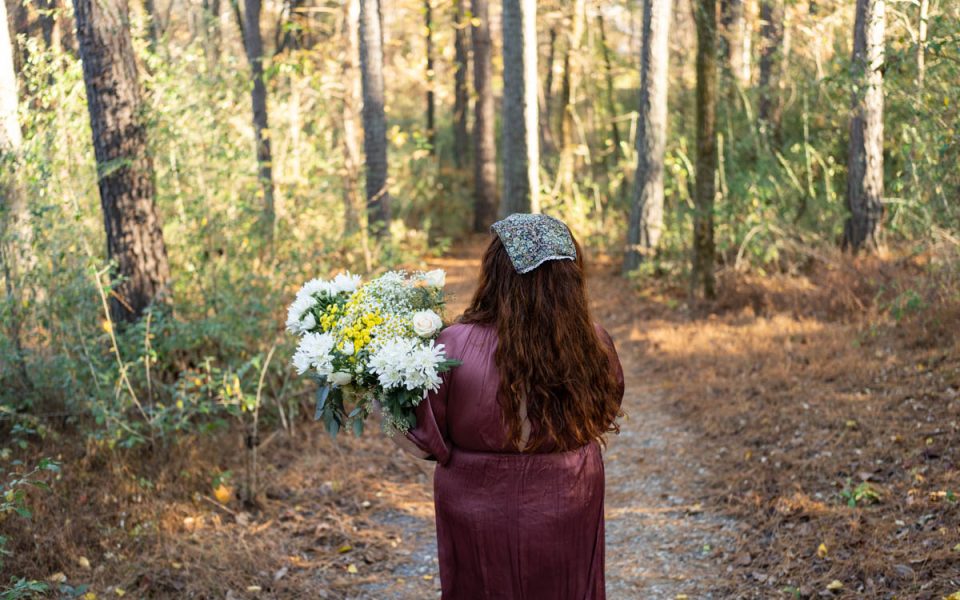Featured photo: Death doula Abigail Textor-Dobbins walks around All Souls Green Burial Site in Greensboro. (photo by Carolyn de Berry)
The first home funeral Abigail Textor-Dobbins helped organize involved a potato gun.
She was living as part of a Quaker community in Oregon when one of her closest friends, Alex, passed away. And rather than hold a common funeral with a casket and a burial, Textor-Dobbins’ friend had his own personal wishes for how he wanted to be ushered into the afterlife.
“We shot his ashes out of a potato gun that he made himself,” she remembers. “His funeral was at midnight. We did things his way; it was epically beautiful.”
Ever since then, Textor-Dobbins has been working as a death doula.
“It’s really exciting and beautiful work,” she says. “It’s hard; it’s heavy, but it’s not scary.”
While many will have heard of birth doulas, or non-healthcare professionals who help mothers and families through the birthing process, death doulas help cater to those who are nearing the end of their life. Many specialize in one aspect of the work, which can include things like home funerals, transition, grief and comfort care.
For Textor-Dobbins, focusing on home funerals has been her life’s passion since entering the profession a decade ago.
“Everybody’s different and everybody’s doula is different,” she says.

Because the profession is relatively new, there isn’t a single way to become licensed or certified as a death doula. However, one thing is clear.
“As a death doula, you can’t offer medical care or medical advice,” Textor-Dobbins explains. “We’re non-medical, comfort-care specialists who care for people in transition like someone would care for someone in birth. We’re educated in the dying process and can let you know what to expect. We’re just end-of-life guides.”
Part of the work looks like helping families fill out various paperwork or planning logistics for dying relatives. If doulas are working directly with the dying patient, Textor-Dobbins says, it’s even better.
“We can advocate for their wishes and their needs,” she says. “If you don’t have an advocate, that can fall through the cracks.”
A lot of the kind of work that death doulas do was previously done by hospice workers, Textor-Dobbins says, but because of the dwindling numbers of professionals in that field, they’re overextended and not able to provide the more involved emotional support.
“We are filling the holes in that care paradigm,” she says.
Some of Textor-Dobbins’ favorite parts of the job involve legacy work where she’ll help the client go through their life to figure out how best to tell it. Sometimes that involves living funerals where the patient gets to meet with and hear from their loved ones while they’re still alive. Other times it can look like creating a book or doing family photo shoots. Like Alex, people can plan their own funerals, too.
“They end up being the most beautiful ceremonies,” she says. “The ideal situation is for me to come in when you realize, I have a certain amount of time left, and I want to make the best of it. And then I ask, ‘Ok, what can we do?’”

Like a birth plan, a peaceful, wholesome death looks different from person to person. But part of the mission, Textor-Dobbins says, is to destigmatize death and dying.
“I think we’ve stopped looking at death,” she says. “We don’t want to look at it anymore, and it’s been really harmful to us and as a society.”
That’s because when people are more open to talking about and thinking about death, they are more open to talking about and thinking about life, she says.
“We are all going to die,” she says. “It’s extremely unifying. And knowing that I’m going to die makes me look at every moment differently. I look at my son — he just turned one — and I realize that this moment is so precious. You can’t be obsessed with death without being obsessed with life.”
Textor-Dobbins sees this effect flow out from her patients to their family members, too. When dying people reconnect with their loved ones, oftentimes those who are being left behind will have a renewed look on life.

“I think the humanity of it all is what gets me,” she says, tears welling in her eyes. “It’s oddly the part that gets me the most is the life part. That’s what makes it so fucking beautiful. You don’t live the same without the idea that you’re going to die.”
Looking into the future, Textor-Dobbins hopes the field of death doulas and death work continues to grow. Right now, a lot of the conversations around holistic death are taking place on the West Coast, but soon a large organization will be founded right in North Carolina. That, she says, will help foster more empathy, openness and compassion for those nearing the end of their lives.
“Dying is not a medical thing; it’s a natural thing,” she says. “It’s a sacred right of passage.”
Learn more about death doulas and find a directory at deathdoulasofnc.com. Find Abigail at deathdoulasofnc.com/abigail.
Join the First Amendment Society, a membership that goes directly to funding TCB‘s newsroom.
We believe that reporting can save the world.
The TCB First Amendment Society recognizes the vital role of a free, unfettered press with a bundling of local experiences designed to build community, and unique engagements with our newsroom that will help you understand, and shape, local journalism’s critical role in uplifting the people in our cities.
All revenue goes directly into the newsroom as reporters’ salaries and freelance commissions.


Leave a Reply